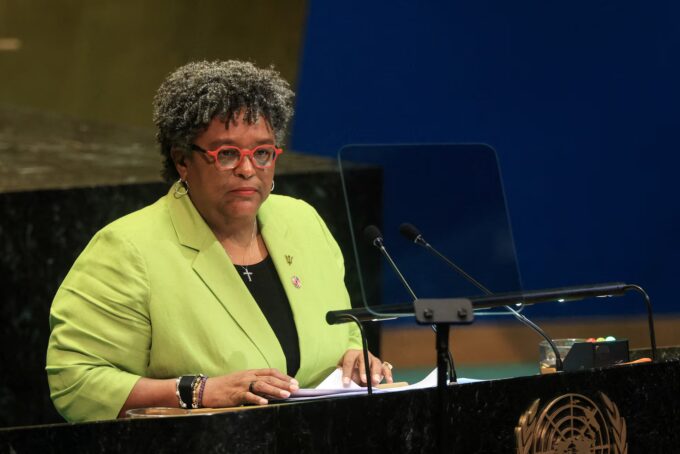Uganda has been thrown into mourning following one of the deadliest road accidents in recent years after 46 people lost their lives in a horrific collision along the busy Kampala-Gulu Highway. The tragic crash, which occurred shortly after midnight at 00:15 local time (21:15 GMT), involved two buses traveling in opposite directions, a lorry, and a car, leaving behind a trail of destruction and grief. The Uganda Police Force confirmed that the accident unfolded when one of the buses attempted to overtake two other vehicles, leading to a devastating head-on and side collision that triggered a chain reaction involving several other motorists.
According to the police statement, one of the buses tried to avoid a crash by swerving sharply but instead caused a violent collision that led multiple vehicles to lose control and overturn. The chaotic scene left dozens of passengers trapped in the wreckage, as survivors and witnesses recounted the horrifying moments that followed. Rescue workers and emergency teams rushed to the site to save lives, but for many, help came too late. The initial death toll was reported as 63, but it was later revised down to 46 after police discovered that some victims earlier believed dead were unconscious and receiving medical treatment.
The injured have been transported to various hospitals in the western town of Kiryandongo and surrounding areas. Health officials say the hospitals are overwhelmed as they battle to stabilize survivors with multiple fractures, head injuries, and burns. Doctors and nurses worked through the night, supported by volunteers and local residents who donated blood and supplies to aid in the rescue and treatment efforts.
In the aftermath of the tragedy, the Uganda Police Force has launched a full investigation to determine the exact cause of the crash. Early findings point to dangerous overtaking and speeding as major contributing factors, reflecting a pattern of reckless driving behavior that has long plagued the nation’s highways. “We continue to lose lives because of avoidable human errors on the road,” said a police spokesperson, emphasizing the urgent need for stricter enforcement of traffic rules and public awareness campaigns.
President Yoweri Museveni expressed deep sorrow over the devastating accident and extended his condolences to the bereaved families. “I have learnt of the tragic accident on the Kampala-Gulu Highway with deep sadness,” the president said in a statement released Tuesday. “I extend my heartfelt condolences to the families that have lost their loved ones and wish a quick recovery to those injured.” Museveni also directed that each family that lost a member be compensated with five million Ugandan shillings (approximately $1,430), while those who sustained injuries receive one million shillings each. He urged all drivers to exercise maximum caution on the road, reminding them that human life is irreplaceable.
The Kampala-Gulu Highway is one of Uganda’s most critical transport routes, linking the capital city to the northern region and serving as a major corridor for passenger and freight traffic. However, the highway is notorious for frequent accidents, often caused by speeding, fatigue, and poor adherence to traffic regulations. Over the past decade, it has witnessed numerous deadly crashes that have claimed hundreds of lives, prompting authorities to consider new safety measures, including improved road signage, increased police patrols, and stricter penalties for reckless drivers.
Residents along the stretch of road where the accident occurred described scenes of despair, with twisted metal, shattered glass, and scattered luggage littering the highway. Many community members joined emergency responders to assist in rescuing trapped passengers before ambulances arrived. “We heard a loud bang and then cries for help,” said one witness. “We rushed to the scene and saw bodies everywhere. It was the worst thing I’ve ever seen.”
The Uganda Red Cross Society also deployed its emergency response team to the site, helping transport victims and coordinate humanitarian support. Officials commended the swift response of first responders, though they lamented the lack of adequate road safety infrastructure and emergency resources that could have reduced the loss of life.
As the nation mourns, calls for road safety reform are growing louder. Traffic accidents have become one of Uganda’s leading causes of death, with thousands killed or injured annually. According to the Uganda Bureau of Statistics, more than 4,000 people die on the country’s roads each year, and many of these fatalities involve long-distance buses and heavy trucks. Poor road conditions, overloading, and driver fatigue remain persistent challenges that authorities have struggled to address effectively.
Transport experts are urging the government to invest more in road maintenance and driver education. “We need a culture change on our roads,” said transportation analyst Michael Kato. “Many of these accidents can be prevented if drivers adhere to the rules, avoid overtaking dangerously, and respect speed limits.” He also called for stricter enforcement of rest periods for long-distance drivers and improved inspection of vehicles before journeys.
The human toll of the Kampala-Gulu tragedy extends far beyond the statistics. Families are left shattered, with many losing breadwinners, children, and friends. At Kiryandongo hospital, scenes of grief filled the corridors as families identified bodies and prayed for the recovery of the injured. Religious leaders and community elders have called for national prayers to honor the victims and promote unity during this painful time.
As the investigation continues, the government has pledged to work closely with local authorities and transport unions to find lasting solutions to Uganda’s road safety crisis. While compensation will bring some relief to grieving families, the tragedy has reignited a national debate on road discipline and accountability.
The Kampala-Gulu Highway crash serves as another grim reminder that Uganda’s roads remain perilous. The loss of 46 lives in a single night has once again underscored the urgency of road safety reforms, stricter enforcement, and public education. For many Ugandans, the hope is that this tragedy will mark a turning point one that leads to real action to make the country’s roads safer for everyone.














Leave a comment